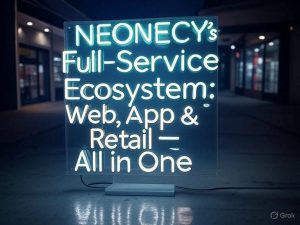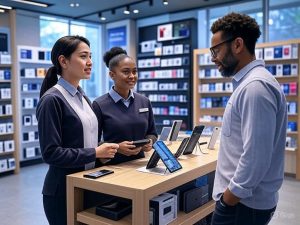The rapid rise of digital ownership in e-commerce is changing how we buy, sell, and value online goods. From NFTs and blockchain-based assets to virtual products and smart contracts, digital ownership is revolutionizing the e-commerce landscape. As more consumers seek unique, verifiable digital experiences, brands must adapt to meet this demand. This blog explores how digital ownership in e-commerce is shaping the future of online retail and what businesses can do to stay ahead.
1. What Is Digital Ownership?
Digital ownership refers to the ability of individuals to claim, prove, and trade ownership of digital assets. These assets can include anything from music, art, and documents to virtual real estate and items in online games. Thanks to blockchain technology, ownership can now be tracked and verified in decentralized, tamper-proof ledgers.
In the context of digital ownership in e-commerce, this translates into consumers owning digital products like NFTs, downloadable content (DLC), or even smart product licenses. These digital items can be resold or transferred just like physical goods.
2. The Role of Blockchain in Digital Ownership
Blockchain is the underlying technology driving the digital ownership in e-commerce revolution. Its decentralized nature ensures that ownership records are secure, transparent, and unalterable. When a digital product is sold via blockchain, a smart contract ensures that all parties fulfill their obligations.
Key blockchain features transforming e-commerce:
-
Transparency: Buyers can verify the authenticity and history of an item.
-
Security: Decentralized systems are much harder to hack or manipulate.
-
Efficiency: Smart contracts automate transactions without intermediaries.
3. NFTs: The Face of Digital Ownership
Non-fungible tokens (NFTs) are perhaps the most recognizable form of digital ownership in e-commerce. Each NFT represents a unique digital item stored on the blockchain. In e-commerce, NFTs can be used for:
-
Digital collectibles
-
Limited edition virtual products
-
Authentication of physical items
-
Membership access or perks
Fashion brands like Gucci and Nike have already begun selling NFT-based products, combining the physical with the digital for a more immersive brand experience.
4. Real-World Applications of Digital Ownership in E-Commerce
Let’s examine how digital ownership in e-commerce is currently being applied:
-
Virtual Goods Sales: Video games and metaverse platforms sell digital clothes, accessories, and tools that users truly own.
-
Tokenized Access: Some online stores issue tokens to grant VIP access to sales or product drops.
-
Digital Twins: Products in the physical world have digital twins (NFTs) to verify authenticity and ownership.
-
Resale Markets: Consumers can resell owned digital items, enabling secondary marketplaces that benefit both buyers and sellers.
5. Customer Trust and Transparency
One of the biggest benefits of digital ownership in e-commerce is improved trust. Because ownership and authenticity are verifiable on the blockchain, customers are more confident in their purchases.
-
Proof of Authenticity: Reduces counterfeit products.
-
Smart Contracts: Ensure terms are met without middlemen.
-
Immutable History: Buyers can view the full transaction record of a product.
Trust translates to better customer satisfaction, fewer disputes, and increased brand loyalty.
6. How E-Commerce Platforms Are Adapting
Major e-commerce platforms are beginning to support digital ownership in e-commerce:
-
Shopify allows merchants to sell NFTs directly through their storefronts.
-
eBay has acquired NFT platforms to integrate digital collectibles into its marketplace.
-
Meta (Facebook/Instagram) is testing features that allow creators to sell digital items directly to users.
These integrations are setting the stage for a more fluid, digital-first shopping experience.
7. Digital Identity and Ownership
Another impact of digital ownership in e-commerce is the evolution of personal digital identity. Consumers now carry their owned assets with them across platforms, forming a persistent digital identity.
This means brands can:
-
Offer customized product recommendations based on owned NFTs
-
Provide loyalty programs tied to digital assets
-
Build communities around product ownership
Digital identity enhances personalization, which is a key driver of customer engagement and retention.
8. Sustainability and Ethical Impacts
The rise of digital ownership in e-commerce also brings sustainability benefits. Digital goods require no physical materials, packaging, or shipping, reducing environmental impact.
Examples include:
-
Digital fashion instead of fast fashion
-
Virtual product try-ons reducing returns
-
NFTs as carbon credits or proof of sustainable purchases
Brands can build ethical narratives around these innovations, appealing to conscious consumers.
9. Monetization Opportunities for Creators and Brands
Digital ownership opens up new monetization paths:
-
Royalty Payments: NFT creators earn a percentage every time their item is resold.
-
Subscription Models: Access to digital content can be token-gated.
-
Microtransactions: Brands can offer in-game or in-app digital purchases.
-
Collaborations: Artists and brands can co-create limited-edition digital products.
All of these strategies benefit from the transparency and automation that blockchain provides.
10. Challenges in Adoption
Despite its promise, digital ownership in e-commerce faces several hurdles:
-
Education Gap: Many consumers still don’t understand NFTs or blockchain.
-
Environmental Concerns: Some blockchains use large amounts of energy.
-
Legal Frameworks: Digital ownership rights and regulations vary globally.
-
Security Risks: Wallets and digital assets can still be compromised.
To overcome these, companies must invest in user-friendly interfaces and robust security measures.
11. The Future of Digital Ownership in E-Commerce
The potential for digital ownership in e-commerce is vast. As Web3 technologies mature, we can expect:
-
Interoperable assets across platforms and games
-
Seamless blending of physical and digital experiences
-
Greater control for creators and consumers over value exchange
Eventually, every digital interaction—from purchasing products to attending events—could involve verifiable digital ownership.
12. How Businesses Can Prepare
To take advantage of digital ownership in e-commerce, businesses should:
-
Explore NFTs and smart contracts for product launches.
-
Educate their audience about the value of owning digital items.
-
Partner with blockchain platforms to build secure systems.
-
Monitor legal developments to remain compliant.
Early adoption can provide a significant competitive advantage as the digital economy grows.
Conclusion
Digital ownership in e-commerce is not just a trend—it’s a paradigm shift. It empowers consumers, reduces fraud, increases personalization, and creates entirely new markets for digital goods. Brands that embrace this change will not only future-proof their businesses but also unlock exciting new ways to engage their audience.
From NFT integration to blockchain-backed product authentication, the transformation is already underway. The key is to act now—before your competitors do.





